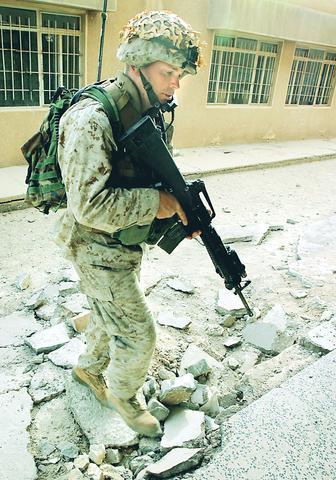The beheading of an American hostage in supposed reprisal for abuses by US soldiers has injected new venom into Washington's project in Iraq just as threats of widespread insurrection appeared to be fading.
Nick Berg, a 26-year-old civilian, may have been killed by Abu Musab al-Zarqawi, the Jordanian leader of al-Qaeda in Iraq, according to a Web site video purportedly showing Berg's last moments. It increased fears for other hostages, including a US soldier.
Meanwhile, the young Iraqi cleric leading a month-old Shiite uprising against US occupation said yesterday that he was prepared to disband his militia army.

PHOTO: AP
But, with a now familiar ambivalence, Moqtada al-Sadr also told a rare news conference at Islam's holiest Shiite shrine he would still oppose a US-led occupation he likened to the tyrannical rule of former Iraqi president Saddam Hussein.
Under mounting pressure from rivals in the Shiite establishment and from US forces on the ground, his aides on Tuesday had already pencilled in their agreement to a deal that could end the insurgency.
Fresh fighting with Sadr's Mehdi Army militia in the holy city of Kerbala yesterday left at least 20 guerrillas dead, the US military said. After a night and morning of fighting, young men loyal to Sadr were holed up in a mosque and surrounded by US tanks. There were also scattered skirmishes elsewhere.
But Sadr's chief lieutenant in Najaf reached an deal in principle with the main Shiite parties late on Tuesday that could see his fighters absorbed into a broader Iraqi force to take over security while US troops pulled out of cities.
In other developments, coalition spokesman Dan Senor said yesterday that Berg was never under US custody despite claims from his family.
Senor told reporters that Berg was detained by Iraqi police in Mosul. The Iraqis informed the Americans and the FBI met with Berg three times to determine what he was doing in Iraq.
Asked for details about Berg's last weeks in Iraq, Senor replied: "We are obviously trying to piece all this together, and there's a thorough investigation."
Also See Story:
Terrorist leader al-Zarqawi, gaining an increasingly influential position

Right-wing political scientist Laura Fernandez on Sunday won Costa Rica’s presidential election by a landslide, after promising to crack down on rising violence linked to the cocaine trade. Fernandez’s nearest rival, economist Alvaro Ramos, conceded defeat as results showed the ruling party far exceeding the threshold of 40 percent needed to avoid a runoff. With 94 percent of polling stations counted, the political heir of outgoing Costa Rican President Rodrigo Chaves had captured 48.3 percent of the vote compared with Ramos’ 33.4 percent, the Supreme Electoral Tribunal said. As soon as the first results were announced, members of Fernandez’s Sovereign People’s Party

MORE RESPONSIBILITY: Draftees would be expected to fight alongside professional soldiers, likely requiring the transformation of some training brigades into combat units The armed forces are to start incorporating new conscripts into combined arms brigades this year to enhance combat readiness, the Executive Yuan’s latest policy report said. The new policy would affect Taiwanese men entering the military for their compulsory service, which was extended to one year under reforms by then-president Tsai Ing-wen (蔡英文) in 2022. The conscripts would be trained to operate machine guns, uncrewed aerial vehicles, anti-tank guided missile launchers and Stinger air defense systems, the report said, adding that the basic training would be lengthened to eight weeks. After basic training, conscripts would be sorted into infantry battalions that would take

GROWING AMBITIONS: The scale and tempo of the operations show that the Strait has become the core theater for China to expand its security interests, the report said Chinese military aircraft incursions around Taiwan have surged nearly 15-fold over the past five years, according to a report released yesterday by the Democratic Progressive Party’s (DPP) Department of China Affairs. Sorties in the Taiwan Strait were previously irregular, totaling 380 in 2020, but have since evolved into routine operations, the report showed. “This demonstrates that the Taiwan Strait has become both the starting point and testing ground for Beijing’s expansionist ambitions,” it said. Driven by military expansionism, China is systematically pursuing actions aimed at altering the regional “status quo,” the department said, adding that Taiwan represents the most critical link in China’s

‘REALLY PROUD’: Nvidia would not be possible without Taiwan, Huang said, adding that TSMC would be increasing its capacity by 100 percent Nvidia Corp CEO Jensen Huang (黃仁勳) on Saturday praised and lightly cajoled his major Taiwanese suppliers to produce more to help power strong demand for artificial intelligence (AI), capping a visit to the country of his birth, where he has been mobbed by adoring fans at every step. Speaking at an impromptu press conference in the rain outside a Taipei restaurant, where he had hosted suppliers for a “trillion-dollar dinner,” named after the market capitalization of those firms attending, Huang said this would be another good year for business. “TSMC needs to work very hard this year because I need a lot